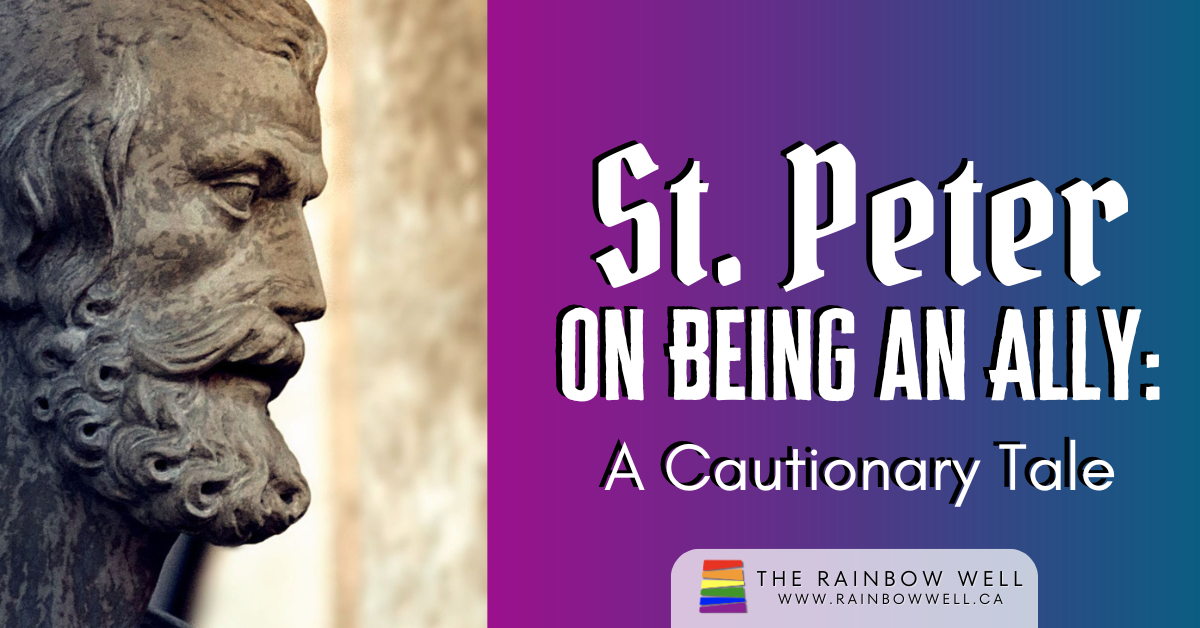St Peter On Being An Ally

Over the last several years, I have spent a lot of time and energy exploring what it means to be an ally- or rather, how to practice allyship. On one hand, as the white father of a black son, I need to understand and embrace these commitments for his sake. On the other hand, as a queer man who has experienced consistent discrimination, I know what I want and need from those I love and trust.
Because I come at this from the context of my faith as a Christian, something occurred to me that stuck with me. As I had been considering examples of allyship in Scripture, I kept coming up with examples that were less than compelling. So I put the question aside. Then, something happened: A friend with a noted commitment to allyship, who had been advocating strongly on my behalf, abruptly backed off when the pressure turned to threats.
I tried hard to understand why they made this choice and to honour their agency to make the choice they felt was best for them. However, it left me feeling devastated, grieved and betrayed. And it was in that last feeling- that last word, “betrayed”- that an example from the Bible came sharply to mind: Peter on the night Jesus was arrested. Let me unpack this a bit.
On the night Jesus was betrayed and arrested, Peter jumped to Jesus’s defense by drawing his sword and hacking off the ear of one of the men who had come. Now, all things considered, Peter’s response makes sense. He believed that Jesus was the Messiah, the promised saviour and legitimate King of Israel. He responded with a passion that most of us would long for people to embody in their commitment to allyship.
Yet Jesus stops Peter, saying “Put your sword away!”. Peter made a common mistake many pursing allyship make: He behaved as though he knew best. Peter failed to defer to Jesus for how he wanted to respond. Rather, he assumed that he knew what was best. He imposed his privileged perspective onto the situation.
All too often those committed to allyship with the well-intentions charge ahead in their zeal and do more harm than good. Like with Peter, it is often in the heat of the moment. Peter’s passion and desire to practice allyship were good and commendable but in practice caused real harm, both to the man he struck and to the non-violent intentions of Jesus. Jesus knew the kind of resistance He wanted to practice and Peter rushed passed it in an instant.
Things suddenly shifted for Peter. With Jesus arrested and His followers scattered, Peter found himself largely alone facing what seemed a doomed situation. Jesus stood accused and reviled with little to no support and anyone associated with Him was at risk of a similar fate. And so, when victory seemed impossible and the price seemed too high, Peter denied Christ.
While we do not know what Peter was thinking in those moments, it is not far-fetched to think about how he might have justified his choice. After all, what good could he do Jesus or his people if he was arrested or worse? This wasn’t really his fight. Sure, he believed in it, but of Jesus refused to fight, why should he? What good would it do to go down with the ship?
All too often, in the face of real sacrifice, those who express a commitment to allyship exercise one of their central privileges: the freedom to opt-out. And it is not like the reasoning has no merit. After all, our goal is not self-destruction. However, far too few people committed to allyship are willing to remain in faithful solidarity in the face of resistance, rejection, and costly outcomes for them.
The things is, Jesus saw it coming. He told Peter he would deny him. While we often read it as a prophetic prediction, I cannot help but think it was just the hard-earned wisdom of a man who had experienced rejection and abandonment many times before. Even in my own life, I have accurately (if sadly) predicted the withdrawal of support and solidarity from friends far in advance. There was no clairvoyance necessary. Just the painful experiences repeated more often than I’d like to remember.
The good news is that Peter learned his lesson. He became the kind of friend that Jesus called him to be. In the end, he even died for his devotion to the way of Jesus, crucified. And this is, perhaps, the most important lesson for those committed to allyship to learn: when you fully embrace the self-sacrificial solidarity of a true allyship, you still might “die” in the end.
After all, it’s not about winning. It’s about love.
. . .
by Jamie Arpin-Ricci (he/him), founder of The Rainbow Well

